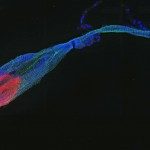Link to Pubmed [PMID] – 8631829
J. Biol. Chem. 1996 Mar;271(13):7844-50
In unstimulated cells, the transcription factor NF-kappaB is held in the cytoplasm in an inactive state by the inhibitor protein IkappaBalpha. Stimulation of cells results in rapid phosphorylation and degradation of IkappaBalpha, thus releasing NF-kappaB, which translocates to the nucleus and activates transcription of responsive genes. Here we demonstrate that in cells where proteasomal degradation is inhibited, signal induction by tumor necrosis factor alpha results in the rapid accumulation of higher molecular weight forms of IkappaBalpha that dissociate from NF-kappaB and are consistent with ubiquitin conjugation. Removal of the high molecular weight forms of IkappaBalpha by a recombinant ubiquitin carboxyl-terminal hydrolase and reactivity of the immunopurified material with a monoclonal antibody specific for ubiquitin indicated that IkappaBalpha was conjugated to multiple copies of ubiquitin. Western blot analysis of immunopurified IkappaBalpha from cells expressing epitope-tagged versions of IkappaBalpha and ubiquitin revealed the presence of multiple copies of covalently bound tagged ubiquitin. An S32A/S36A mutant of IkappaBalpha that is neither phosphorylated nor degraded in response to signal induction fails to undergo inducible ubiquitination in vivo. Thus signal-induced activation of NF-kappaB involves phosphorylation-dependent ubiquitination of IkappaBalpha, which targets the protein for rapid degradation by the proteasome and releases NF-kappaB for translocation to the nucleus.

